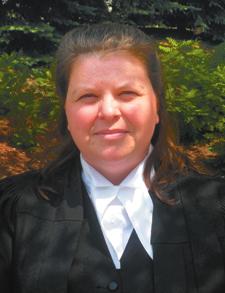
After two months, the accused is still at the Ottawa-Carleton Detention Centre, where he is in protective custody and on suicide watch. He says he now has a cellmate, which has eased the isolation of life at the Detention Centre.
On May 6, a few days shy of Mother’s Day, his name and face were splashed on the covers of tabloids and mainstream papers. He was labelled a sexual predator, and a public health message was issued asking that his sexual partners get tested for STIs.
Outside of Ottawa, his mother saw her 29-year-old son’s face on the cover of the local paper. That was how she discovered he was HIV-positive.
The overnight exposure and the news of his arrest catapulted the accused into an unwelcome limelight. He became Ottawa’s most high-profile example of a gay man accused of aggravated sexual assault for failing to disclose his HIV status.
The accused was initially charged with nine counts of sexual assault, all stemming from one sexual partner. The first complainant, an 18-year-old man, told the police — and the newspapers — he had unprotected sex with the accused, who failed to disclose his HIV status when asked.
Since then, the accused has spent nearly two months in jail — in protective custody and under a suicide watch. At the time of his June 29 bail hearing, he faced 21 charges: four attempt murder, four aggravated sexual assault, three sexual assault and 10 additional lesser charges.
A publication ban protects the identity of his six accusers. Xtra has declined to publish the name of the accused.
Given how high profile the case has become, few people have been willing to speak about their connections with the accused, and little is known about his social life.
According to Nancy (not her real name), the accused’s mother, her son was a shy child who never fit in anywhere and had few friends. He has a history of being fired from jobs, she said.
Outside the courthouse in May, Nancy told Xtra she raised several children, mostly on her own. She spoke about how the accused’s biological father had a substance abuse problem and abandoned his children when they were young. She also said she believes her son has a serious drinking problem.
Nancy says she has a close, yet somewhat strained, relationship with her son, who was raised with the help of her mother, the accused’s grandmother. She describes him as a quiet child who earned good grades in school. He attended Laurentian University for one year and dropped out after being sick with mononucleosis. She says he rarely drank and did not smoke until his early 20s. She also recalls the time he took her out to dinner four years ago and told her he was gay. He never told her about his HIV status, however.
In an interview with Xtra, the accused says he was diagnosed with HIV in November 2009. In December, he contacted the Poz Youth Support Group at the AIDS Committee of Ottawa (ACO). The group is for youth living with or affected by HIV and is facilitated by Michael Burtch, the MSM Community Developer for ACO.
Nancy says Burtch has been “incredibly supportive” of her and her son, before and since the accused’s arrest. Burtch has helped her understand what having a gay son means and what the accused was going through as a person recently diagnosed with HIV.
When the accused was arrested, he had been poz for less than six months and had only attended the ACO youth group a few times. According to his mother, he was able to tell his friends but not her about his poz status.
“I think he was trying to protect me,” says Nancy.
Since health records are private, the only source of information that indicates when the accused was diagnosed with HIV is an alleged online profile for a site called Bareback Exchange (BBX). The accused allegedly wrote on the site in November 2009 that he had just been diagnosed with HIV.
A quote from that posting reads, “Just tested poz, got my count today.” His count, or viral load, was 52,878 — a relatively low viral load and not likely high enough to pass on the virus.
BBX is primarily a site for gay men who are HIV-positive and want unprotected sex. The site is also connected with the online phenomena called “gift giving” and “bug chasing.” Bug chasers are those who seek out HIV while gift givers are poz men who claim they wish to give HIV to negative partners.
Barry Adams is a senior scientist and director of prevention research at the Ontario HIV Treatment Network and a professor in the department of sociology, anthropology and criminology at the University of Windsor.
“This has been a long-standing theme — it’s out there, especially on the internet — and it’s subject to a great deal of speculation,” says Adams.
Adams says it is unclear whether gift giving is strictly fantasized about or is something anyone actually does.
“The degree to which that has been investigated, it looks like — in a number of instances — it is people who are already positive who are replaying scenarios in their heads,” says Adams.
Michael Graydon, a sociologist who has written on gift giving, says some gay men fantasize about it as a way of leaving a sense of loneliness and becoming part of a brotherhood.
In a paper in Culture, Health and Sexuality Graydon writes, “we consider gift-giver narratives, not as indicative of gay men’s fascination with abject forms of sex but, rather, as expressions of an abject despair. A despair born out of an experience of HIV so isolating and nullifying that it is unimaginable and at the same time inescapable.”
Xtra showed the accused copies of his alleged BBX posting, but he declined to answer questions about them. When he regained his composure, he said he could not comment any further because his lawyer had advised him not to discuss details of the case.
But the poster of the BBX profile makes no attempt to hide his HIV status. Nor did the accused hide his status at youth groups he attended or from friends who knew him before his arrest.
Elliot Youden, a member of the poz youth group and an openly HIV-positive man, was upfront about his thoughts on the accused.
“For me, he was open from the word go, and that was why I was so surprised about these particular charges,” says Youden. “The last time I saw him was at the youth group, and he was talking about the issues he was having with the guy he was seeing because he had disclosed and the guy was standoffish about his status — so I was very much under the impression that he was quite actively disclosing.”
The accused also disclosed his status to his roommate, Stephen Miron.
Miron, 49, says he had been a Facebook friend with the accused for about a year. When Miron advertised that he was looking for a roommate, the accused replied and subsequently moved in with him. That was in December 2009.
According to Miron, the day the accused moved into the Craig Henry Dr townhouse, he disclosed his HIV status.
Miron — who has already provided a statement to the police — said he did not want his words to be misconstrued in the trial.
However, Miron says he was aware of the accused’s liaison with the first complainant — the 18-year-old gay man. In early newspaper reports, this complainant said he discovered the accused was HIV-positive through Miron.
Miron says the 18-year-old turned to him for support after he tested positive for HIV, and he reiterated that he did not like what the accused did to the 18-year-old.
Miron says that while he and the accused had some disagreements, they got along fine.
The accused told Xtra that Miron began outing his health status to men he dated and started adding his boyfriends on Facebook.
“We talked as though we were friends. He outed me before I got a chance to tell people. I like to live a quiet, private life. I guess I’ll never be able to do that again,” he says.
Nancy supports her son’s view. She told Xtra that when she went to pick up the accused’s clothes, the day after his arrest, the 18-year-old was at the house with Miron.
“This whole thing that started from a fight with his roommate is going to ruin his whole life,” says Nancy, adding that the fight started when her son didn’t think Miron should be pursuing an 18-year-old and tried to stop him from doing so.
Miron denies that there was a fight and states that he was alone when the accused’s mother and sister and a police officer came to pick up the accused’s clothes. He also stated the 18-year-old complainant was the only friend of the accused he added on Facebook.
The accused remains in protective custody at Ottawa-Carleton Detention Centre.
When Xtra spoke to him, he said he was not on any antiretroviral medication and had been taken, on several occasions, to Ottawa General Hospital for blood work.
He also said that he tested positive for HIV at GayZone in November and that he was never given any counselling or any instructions on disclosing his HIV status to others.
GayZone is a partnership among several health facilities and non-governmental organizations and has been operating for the past two years. The clinic is for gay men and provides a wide range of programs and services, including rapid and anonymous HIV testing.
The clinic follows guidelines issued by the Ontario Ministry of Health that suggest pre-and post-test counselling as well as discussing issues concerning disclosure.
Since his arrest, the charges have mounted against the accused as more people who have been contacted by the police have come forward.
A friend of one of the victims, John — who, like the majority of people Xtra contacted, asked to remain anonymous — says the police have been phoning people from the accused’s phone book and asking them to come forward.
“Apparently the police have been telling the victims that when [the accused] was HIV tested and came back positive, he was specifically told of his responsibility to tell all of his sexual partners,” says John. “Most of the charges are stemming from after that time frame, when he didn’t follow that responsibility. I know it’s hearsay, but it is one of the things that the victims are hearing, and that is probably one of the factors that is causing them a lot more anger.”
The bail hearing was held on June 29. The court’s decision on bail will be heard on July 7. [Update – July 8: the court’s decision has been postponed, check back soon for an update]

 Why you can trust Xtra
Why you can trust Xtra


